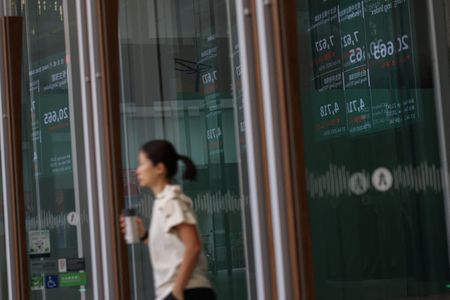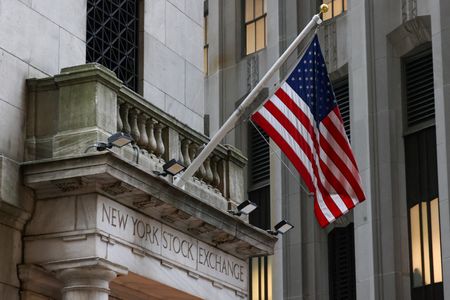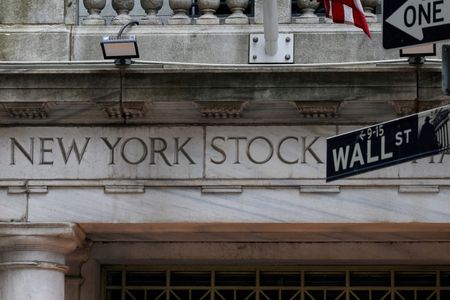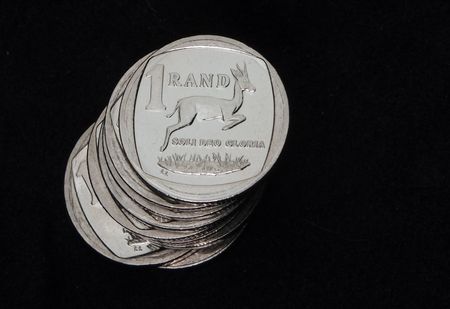By Wayne Cole
SYDNEY (Reuters) -Wall Street share futures slipped with the dollar on Monday, while Treasury yields rose as concerns about erratic U.S. economic policies were underlined by Moody’s downgrade of the country’s credit rating.
Asian shares also fell as a mixed bag of Chinese economic data showed the domestic economy was struggling even as U.S. tariffs began to bite into exports, while the White House kept up its rhetorical pressure on trade partners.
U.S. Treasury Secretary Scott Bessent used television interviews on Sunday to dismiss the Moody’s downgrade, while warning trade partners they would be hit with maximum tariffs if they did not offer deals in “good faith”.
Unease over the United States’ $36 trillion of debt has also mounted as Republicans got closer to passing a sprawling package of tax cuts, which some estimate could add $3 trillion to $5 trillion in new debt over the next decade.
Bessent is off to a G7 meeting this week for more talks, while U.S. Vice President JD Vance and European Commission President Ursula von der Leyen met on Sunday to discuss trade.
“It remains to be seen whether the 10% reciprocal rate – excluding Canada and Mexico – will broadly remain, or will go up or down for some countries,” said JPMorgan economist Michael Feroli, who estimates the current effective tariff of around 13% was equal to a tax rise worth 1.2% of GDP.
“Beyond disruptions from higher tariffs themselves, policy uncertainty should additionally weigh on growth.”
The tariff war has sapped consumer sentiment and analysts will be scouring earnings from Home Depot and Target this week for an update on spending trends.
In markets, MSCI’s broadest index of Asia-Pacific shares outside Japan shed 0.8%, with Japan’s Nikkei down 0.7%.
Chinese blue chips eased 0.4% as retail sales missed forecasts for April, while industrial output slowed but not by as much as feared.
EUROSTOXX 50 futures were flat, while FTSE futures fell 0.3% and DAX futures lost 0.2%.
DOLLAR DOUBTS
S&P 500 futures slid 1% and Nasdaq futures 1.3%, though that followed major rallies last week in the wake of President Donald’s Trump decision to lower levies on China. [.N]
Yields on 10-year Treasuries rose another 7 basis points to 4.51%, extending Friday’s reversal on the Moody’s news, while 30-year yields grazed 5.0%.
Markets are still pricing in only 52 basis points of Federal Reserve rate cuts this year, compared to more than 100 basis points a month ago. Futures imply just a 33% chance of a move by July, rising to 72% by September.
A host of Fed speakers are on the diary this week, including influential New York Fed President John Williams and Vice Chair Philip Jefferson later on Monday. Fed Chair Jerome Powell is also due to speak on Sunday.
The Reserve Bank of Australia is widely expected to cut its rates at a meeting on Tuesday, while likely signalling it is still cautious about easing too far.
Higher yields offered little comfort to the dollar, which was drifting lower amid investor unease with the volatility of U.S. trade policy. The euro edged up 0.1% to $1.1184, while the dollar slipped 0.3% to 145.19 yen.
In an interview published over the weekend, European Central Bank President Christine Lagarde said the dollar’s recent decline reflected a loss of confidence in U.S. policies and this could benefit the euro currency.
Sentiment on the euro was aided by a surprise victory for the centrist candidate in Romania’s presidential election over a far right anti-EU opponent. Centrist candidates also fared well in elections in Poland and Portugal.
In commodity markets, gold was on the rise again after shedding almost 4% last week. The metal was trading 0.6% firmer at $3,222 an ounce. [GOL/]
Oil prices struggled on concerns about the risk of increased output from OPEC and Iran. [O/R]
Brent dropped 37 cents to $65.05 a barrel, while U.S. crude eased 31 cents to $62.18 per barrel.
(Reporting by Wayne Cole; Editing by Jacqueline Wong, Christopher Cushing and Lincoln Feast.)









